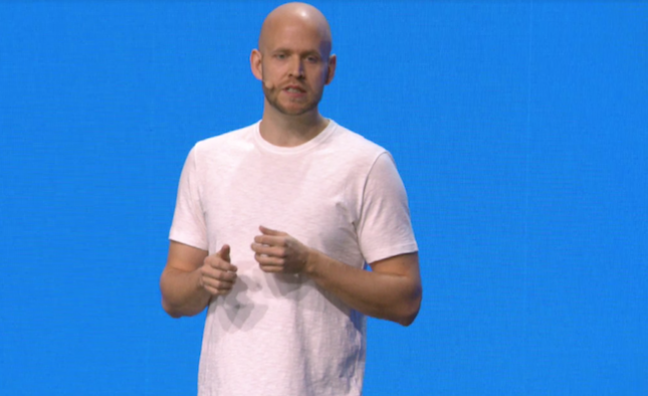Spotify CEO and co-founder Daniel Ek has made his pitch to investors as the streaming giant confirmed it will go public on April 3.
Following the revelations about the service in its filing earlier this month, Spotify staged a live-streamed investors’ day to outline the future growth of the platform. Spotify will also issue guidance on March 26 for its first fiscal year, ahead of listing on the New York Stock Exchange a week later.
Ek – dressed in jeans, t-shirt and trainers – underlined the expansion of the service over the last decade: 159 million active users in 65 territories, including 71 million premium subscribers. Spotify has 35m-plus tracks – a number increasing by 20,000 a day, according to Gustav Soderstrom, chief R&D officer.
Ek also repeated the filing’s bullish claims about helping to restore growth to the music industry. If the filing document suggested Ek was a dreamer, this performance was about the hard reality of the future of the music business.
“Our arrival on the scene caused some concern from others who really didn’t understand our intentions,” he said. “But today, I think Spotify’s impact really speaks for itself.”
He added: “The opportunity in front of us is even bigger than we thought when we started off.”
Ek also stressed that “transparency is a key part of our culture”.
The pitch to investors focused on growth rather than short-term profitability. It was also about claiming that Spotify is not just the biggest but the best – with tech giants Apple Music and Amazon Music clearly in their sights.
“We’re not focused on selling hardware,” said Ek. “We’re not focused on selling books. We’re focused on selling music, and connecting artists with fans.”
He added: “As big as we’ve gotten, and as strong as our leadership position is, there’s still a lot of growth ahead for Spotify.”
We need to help more artists connect with more fans
Daniel Ek
Ek mentioned potential new markets including India, Russia and Africa. And he stressed the streaming platform’s appeal for the Millennial generation: 72% of users are under the age of 34, and 43% are under the age of 24.
During a second presentation, Ek revealed his ambitions for artists as it expands its “marketplace of services”.
The platform currently has 3m artists and Ek wants that to increase to 10m “creators” in the years ahead.
“We need to help more artists connect with more fans,” he added, describing the Spotify ecosystem as “accessible, transparent and democratic”.
In the top tier of most popular artists, Ek said the numbers had increased 28% in recent years to 22,000 – and he wants that to grow to hundreds of thousands of artists enjoying “material success”.
Ek also revealed that playlists and programming are now responsible for 30% of listening.
“That is a massive transformation,” he said, adding that top playlists are “bigger than any US radio station”.
During the event, several artists were cited as Spotify success stories, including Sam Smith and – crucially – independent artists like Lucy Rose and G4shi. Spotify head of creative services, Troy Carter, made an appearance to outline how the service can support artists and spread regional music like K-Pop.
Between presentations by Ek, Gustav Soderstrom revealed some of the key metrics and opportunities for growth. The buzzword for Spotify, it seems, is “ubiquity”.
“We believe you should be allowed to use Spotify on whatever device you want,” said Soderstrom. “We have more than 250 partners that help make Spotify a service you can use on almost any device."
While Spotify does not have its own hardware, Soderstrom stressed that Spotify was available on the first Amazon and Google Home connected speakers in 2014.
While speakers in the home are showing strong growth potential, the automobile has long been a target for music services. Spotify is clearly convinced they have the partnerships to reach a huge audience on the road.
“The car has always been a very important place for music listening,” said Soderstrom. “We are investing heavily.”
The company already has “deep integration” within audio platforms for car manufacturers, he added.
“We believe that more than 50m Spotify users are using Spotify in the car,” he revealed.
We believe that more than 50m Spotify users are using Spotify in the car
Gustav Soderstrom
Another striking figure from Soderstrom’s presentation was that the average user spends 49 minutes a day on Spotify.
There was also a dig at rival services’ performance in connecting fans to new music.
“We are in the business of discovery and we think everyone else is mostly in the business of access,” he said.
While subscriptions have been seen as key to the long-term viability of Spotify, Soderstrom doubled down on the free service which he suggested was integral to the company's overall future success.
As the ad-funded version “reaches millions of users who are still on the fence about paying for music”, Soderstrom added that Spotify would likely be their first choice when they come around to the idea of paying for music.
At the start of the presentation, Ek also explained why Spotify had opted for a direct listing in the US.
“The traditional model for taking a company public isn’t good for us,” said Ek. “For us, going public has never been about the pomp or circumstance of it all.”
He added: “The most important day isn’t our listing day: it’s the day after, and the day after that. That’s when we continue the hard work of helping one million artists to be able to live off their art.”
So perhaps Ek is still a dreamer after all...









